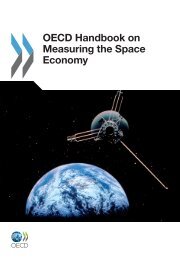Evaluating Country Programmes - OECD Online Bookshop
Evaluating Country Programmes - OECD Online Bookshop
Evaluating Country Programmes - OECD Online Bookshop
You also want an ePaper? Increase the reach of your titles
YUMPU automatically turns print PDFs into web optimized ePapers that Google loves.
<strong>Evaluating</strong> <strong>Country</strong> <strong>Programmes</strong><br />
142<br />
Responsibilities: When all aspects of project design have been participatory<br />
and monitoring, when feedback and evaluation modalities are known by the actors<br />
(i.e. local programme partners), then accountability for project management and,<br />
consequently, the development process is handled by local partners. In order to be<br />
timely, therefore, the tasks for evaluation and self-assessment at lower levels (e.g.<br />
target groups or communities) should be handled by local partners and programme<br />
support organisations. A donor would only be involved in keeping track of results<br />
for inclusion in the final CPE. The tasks for evaluations (i.e. other than CPEs) on<br />
higher levels of involvement (e.g. with government partners) should be shared<br />
between the programme/project local partners and donors. To enhance capacitybuilding,<br />
accountability and ownership in this respect, a local partner should<br />
always take a lead in the process. Tasks for CPEs should be shared equally<br />
between the donor and host government, and with adequate participation of<br />
target group representatives.<br />
Accountability: Accountability in any form presumes vested interests (including<br />
political and material) and investment (i.e. resources – human and material) by<br />
both the donor and local partner. This determines the basis for ownership of both<br />
the programme and results. Furthermore, accountability presumes a level of<br />
empowerment which will allow for a genuine dialogue (transparent and free from<br />
politics) among partners. For this to happen, information flow must be open so as<br />
to enable informed decisions and choices. This applies to all levels of partnership<br />
concerned. The CPE then evaluates the results of this kind of partnership, which are<br />
subsequently used for mutual benefit in development co-operation.<br />
Planning: During the planning and undertaking of CPEs, partners should allow<br />
enough time for donor and partner alike to reflect critically on their concepts and<br />
values in order to be able to fit them into the realities of development co-operation<br />
partnership. Hence, adequate time needs to be allocated for CPE events.<br />
Information-sharing: Host governments and donors should initiate countryspecific<br />
forums for exchange of information and experiences in relation to the CPEs<br />
and for searching for new and better ways of learning and of relating to local people.<br />
The outputs of such forums could have significant value worldwide in shaping the<br />
principles of development co-operation.<br />
Partnership: Partnership becomes real only when there is a shared sense of<br />
purpose and commitment, without which it is merely ideological. Partnership is<br />
not static and may not need to be sustained indefinitely. However, it has to be<br />
mutually built and cultivated to grow to a level suitable to impact positively on<br />
its stakeholders. Partners in development co-operation should be able to determine<br />
the level of partnership attained during a certain period under evaluation<br />
by using simple (and perhaps contextual) criteria and indicators to be designed<br />
at the initial stage of a programme. This will help to broaden the traditional<br />
<strong>OECD</strong> 1999

















![CQE=U]^\]Z: KAZAKHSTAN - OECD Online Bookshop](https://img.yumpu.com/3915768/1/190x253/cqeuz-kazakhstan-oecd-online-bookshop.jpg?quality=85)